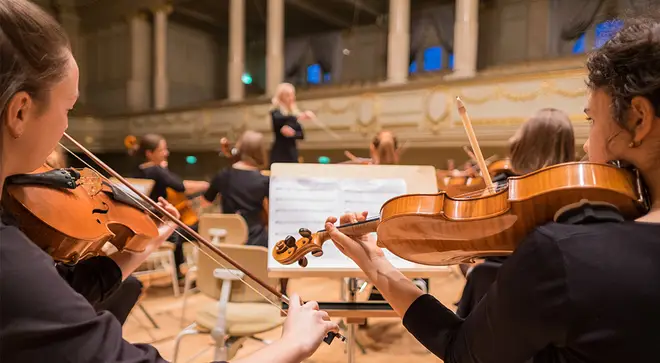On Air Now
The Classic FM Hall of Fame Hour with Tim Lihoreau 9am - 10am
25 September 2020, 15:18

Musicians’ Union report also comes with a stark warning that 87 percent of musicians will face serious financial hardship this autumn and winter.
A third of musicians are considering leaving the industry due to the financial repercussions of the COVID-19 pandemic, a report has found.
New research from the Musicians’ Union reveals nearly half (47 percent) of its musician members have already been forced to seek work outside of the industry.
The union – which represents more than 32,000 musicians working across all sectors of the music industry – also says 87 percent of its members will face financial hardship when the government support schemes end.
“Musicians are working in supermarkets, being Deliveroo drivers, going back to things they trained for early in life,” Horace Trubridge, the union’s general secretary, told The Guardian. “Anything but music – that’s the problem.
“We’re going into an autumn and winter with months of no work, and no financial support from the government at all apart from universal credit – which is appalling for an industry that’s worth £5.2bn.”
Read more: Madrid opera erupts as audience protests crowding in cheap seats >

Verdi’s A Masked Ball performance abandoned after audience protest over lack of social distancing
The government has announced no plans to extend the furlough scheme, which has helped retain 9.6 million jobs, or the SEISS scheme, which has supported freelance workers – with both currently set to end in October.
There have been several calls from trade unions to extend the furlough scheme to prevent a “tsunami of job losses”.
The Musicians’ Union and Incorporated Society of Musicians have both continually called on the government to extend the SEISS scheme, on which musicians – around 94 percent of whom work freelance in the UK – have been reliant.
Ministers are also being called on by the MU to implement the widely reported ‘Seat Out to Help Out’ scheme, to help encourage audiences back to concert halls and theatres.
In the report, seven in 10 (70 percent) musicians said they were unable to undertake more than a quarter of their usual work. At this point in the pandemic, concert halls are allowed to open with limited audiences. There are some concerts and performances happening, but nowhere near as many as at the beginning of the year.
🚨34% musicians may quit the industry due to #Covid19
— Musicians' Union (@WeAreTheMU) September 22, 2020
🚨47% have been forced to look for work outside of music
🚨88% do not think that Government has done enough to support musicians.
Be sure your voice is heard. Write to your MP > https://t.co/XBBgT2s3TY #BehindEveryMusician pic.twitter.com/TUg7ma4jWk
Trubridge also criticised how the £1.57bn package for the arts is being distributed to museums and theatres, but not to individuals, who are crucial to the venues’ success going forward.
Coming into the autumn and winter months, as restrictions begin to tighten again and music venues show no sign of being able to reopen with full audiences, freelance musicians and arts workers will be stuck with only universal credit to rely on.
Many arts organisations have also adopted their own fundraising projects to support their musicians who have been placed out of work.
In response, a DCMS spokesperson told The Guardian: “We are working flat out to support our world-class performing arts sector through challenging times. Our unprecedented £1.57bn Culture Recovery Fund builds on £200m in emergency public funding to stabilise organisations, protect jobs and ensure work continues to flow to freelancers.
“We have already provided emergency funding to support 135 grassroots music venues and are processing applications for more than £800m of additional grant funding. We are working closely with the sector to ensure this funding is distributed quickly and fairly.”